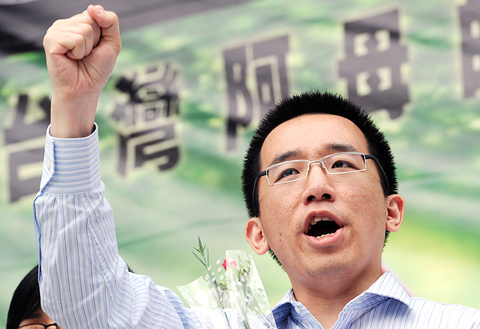Former president Chen Shui-bian’s (陳水扁) mother yesterday said at a protest against his detention that she was saddened by the fact that for the past two years her son has been unable to call her on Mother’s Day.
Chen Lee Shen (陳李慎) came to Taipei from Tainan to join a sit-in rally on Jinan Road calling for Chen’s release that was organized by various pro-localization groups, including some Democratic Progressive Party officials from southern Taiwan.
“I have not seen my son for so long. I have not heard his voice for so long,” she said, crying. “I feel deep sadness and pain every day. I am more than 80 years old, but I have to live with that pain every day.”

PHOTO: SAM YEH, AFP
Today marks the former president’s 551st day in custody over money laundering and graft charges.
“My son has been wronged. He is innocent,” his mother told the crowd.
Chen Lee Shen was accompanied by her two daughters and Chen Shui-bian’s son, Chen Chih-chung (陳致中).
An estimated 5,000 people joined the rally. Hundreds of Chen and Taiwanese independence supporters were bused in from all over the country to join the protest.
The Taiwan High Court last month prolonged Chen’s detention until June 23.
“The justice system is dead, but A-Bian [Chen Shui-bian] is not lonely. A-Bian’s mother is not lonely. We are always with them and will always support them,” Central Taiwan Society president Chen Wan-te (陳萬得) told the crowd.
A few blocks away on Ketagalan Boulevard, a second protest took place. Unlike the rambunctious crowd on Jinan Road, however, this protest offered something far more sober: silence. Under the watchful eye of a dozen police officers, more than 1,000 plastic stools were arranged, each anchoring a balloon. When viewed from above, they formed the character “Ma,” or horse — President Ma Ying-jeou’s (馬英九) surname — with a large yellow arrow pointing at the Presidential Office a few hundred meters away. At one point, a Buddhist monk walked among the chairs and stood there for a few moments in contemplation.
“Justice is dead,” read signs posted around the venue. A picture of a plaque from Green Island, which served as a prison for political prisoners during the White Terror era, also graced the area.
The former president was first detained on Nov. 12, 2008, and released on Dec. 13, 2008, following his indictment. He was detained again on Dec. 30, 2008, after the Taipei District Court approved a request by prosecutors to take him back into custody. He has remained in detention ever since.

NATIONAL SECURITY THREAT: An official said that Guan Guan’s comments had gone beyond the threshold of free speech, as she advocated for the destruction of the ROC China-born media influencer Guan Guan’s (關關) residency permit has been revoked for repeatedly posting pro-China content that threatens national security, the National Immigration Agency said yesterday. Guan Guan has said many controversial things in her videos posted to Douyin (抖音), including “the red flag will soon be painted all over Taiwan” and “Taiwan is an inseparable part of China,” while expressing hope for expedited “reunification.” The agency received multiple reports alleging that Guan Guan had advocated for armed reunification last year. After investigating, the agency last month issued a notice requiring her to appear and account for her actions. Guan Guan appeared as required,

A strong cold air mass is expected to arrive tonight, bringing a change in weather and a drop in temperature, the Central Weather Administration (CWA) said. The coldest time would be early on Thursday morning, with temperatures in some areas dipping as low as 8°C, it said. Daytime highs yesterday were 22°C to 24°C in northern and eastern Taiwan, and about 25°C to 28°C in the central and southern regions, it said. However, nighttime lows would dip to about 15°C to 16°C in central and northern Taiwan as well as the northeast, and 17°C to 19°C elsewhere, it said. Tropical Storm Nokaen, currently

‘NATO-PLUS’: ‘Our strategic partners in the Indo-Pacific are facing increasing aggression by the Chinese Communist Party,’ US Representative Rob Wittman said The US House of Representatives on Monday released its version of the Consolidated Appropriations Act, which includes US$1.15 billion to support security cooperation with Taiwan. The omnibus act, covering US$1.2 trillion of spending, allocates US$1 billion for the Taiwan Security Cooperation Initiative, as well as US$150 million for the replacement of defense articles and reimbursement of defense services provided to Taiwan. The fund allocations were based on the US National Defense Authorization Act for fiscal 2026 that was passed by the US Congress last month and authorized up to US$1 billion to the US Defense Security Cooperation Agency in support of the

PAPERS, PLEASE: The gang exploited the high value of the passports, selling them at inflated prices to Chinese buyers, who would treat them as ‘invisibility cloaks’ The Yilan District Court has handed four members of a syndicate prison terms ranging from one year and two months to two years and two months for their involvement in a scheme to purchase Taiwanese passports and resell them abroad at a massive markup. A Chinese human smuggling syndicate purchased Taiwanese passports through local criminal networks, exploiting the passports’ visa-free travel privileges to turn a profit of more than 20 times the original price, the court said. Such criminal organizations enable people to impersonate Taiwanese when entering and exiting Taiwan and other countries, undermining social order and the credibility of the nation’s